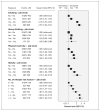Associations of job strain and lifestyle risk factors with risk of coronary artery disease: a meta-analysis of individual participant data
- PMID: 23670152
- PMCID: PMC3680555
- DOI: 10.1503/cmaj.121735
Associations of job strain and lifestyle risk factors with risk of coronary artery disease: a meta-analysis of individual participant data
Abstract
Background: It is unclear whether a healthy lifestyle mitigates the adverse effects of job strain on coronary artery disease. We examined the associations of job strain and lifestyle risk factors with the risk of coronary artery disease.
Methods: We pooled individual-level data from 7 cohort studies comprising 102 128 men and women who were free of existing coronary artery disease at baseline (1985-2000). Questionnaires were used to measure job strain (yes v. no) and 4 lifestyle risk factors: current smoking, physical inactivity, heavy drinking and obesity. We grouped participants into 3 lifestyle categories: healthy (no lifestyle risk factors), moderately unhealthy (1 risk factor) and unhealthy (2-4 risk factors). The primary outcome was incident coronary artery disease (defined as first nonfatal myocardial infarction or cardiac-related death).
Results: There were 1086 incident events in 743,948 person-years at risk during a mean follow-up of 7.3 years. The risk of coronary artery disease among people who had an unhealthy lifestyle compared with those who had a healthy lifestyle (hazard ratio [HR] 2.55, 95% confidence interval [CI] 2.18-2.98; population attributable risk 26.4%) was higher than the risk among participants who had job strain compared with those who had no job strain (HR 1.25, 95% CI 1.06-1.47; population attributable risk 3.8%). The 10-year incidence of coronary artery disease among participants with job strain and a healthy lifestyle (14.7 per 1000) was 53% lower than the incidence among those with job strain and an unhealthy lifestyle (31.2 per 1000).
Interpretation: The risk of coronary artery disease was highest among participants who reported job strain and an unhealthy lifestyle; those with job strain and a healthy lifestyle had half the rate of disease. A healthy lifestyle may substantially reduce disease risk among people with job strain.
Figures

Comment in
-
Job strain, health behaviours and heart disease.CMAJ. 2013 Oct 1;185(14):1251. doi: 10.1503/cmaj.113-2135. CMAJ. 2013. PMID: 24082043 Free PMC article. No abstract available.
-
Job strain and lifestyle factors.CMAJ. 2014 Jan 7;186(1):63-4. doi: 10.1503/cmaj.114-0003. CMAJ. 2014. PMID: 24396125 Free PMC article. No abstract available.
References
-
- Brotman DJ, Golden SH, Wittstein IS. The cardiovascular toll of stress. Lancet 2007;370:1089–100 - PubMed
-
- Rosengren A, Hawken S, Ounpuu S, et al. Association of psychosocial risk factors with risk of acute myocardial infarction in 11119 cases and 13648 controls from 52 countries (the INTERHEART study): case-control study. Lancet 2004;364:953–62 - PubMed
-
- Belkic K, Schnall P, Landsbergis P, et al. The workplace and cardiovascular health: conclusions and thoughts for a future agenda. Occup Med 2000;15:307–21 - PubMed
-
- Kivimäki M, Virtanen M, Elovainio M, et al. Work stress in the etiology of coronary heart disease — a meta-analysis. Scand J Work Environ Health 2006;32:431–42 - PubMed
-
- Eller NH, Netterstrom B, Gyntelberg F, et al. Work-related psychosocial factors and the development of ischemic heart disease: a systematic review. Cardiol Rev 2009;17:83–97 - PubMed
Publication types
MeSH terms
Grants and funding
LinkOut - more resources
Full Text Sources
Other Literature Sources
Medical
